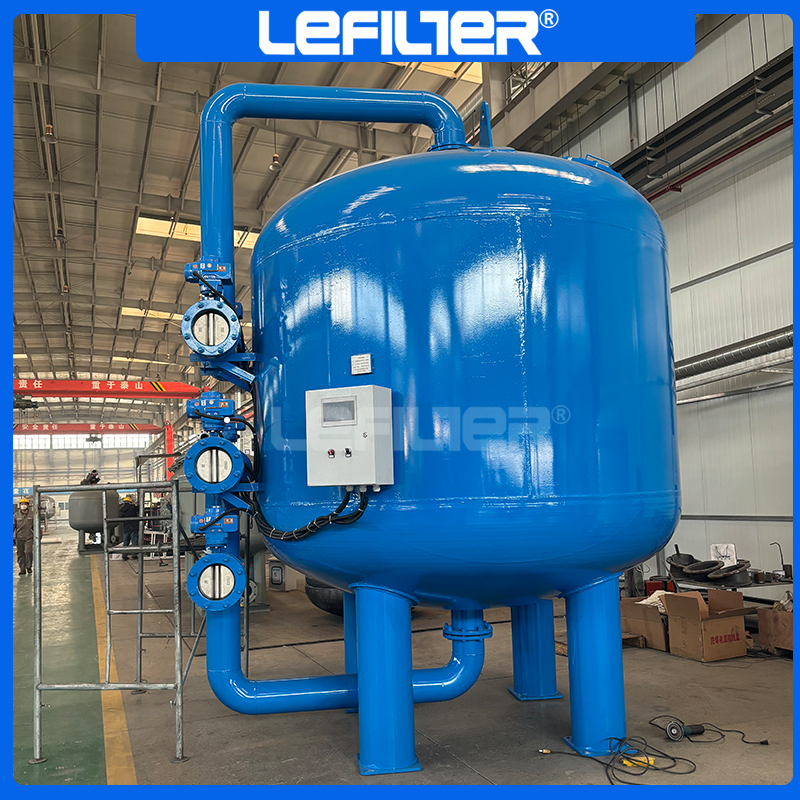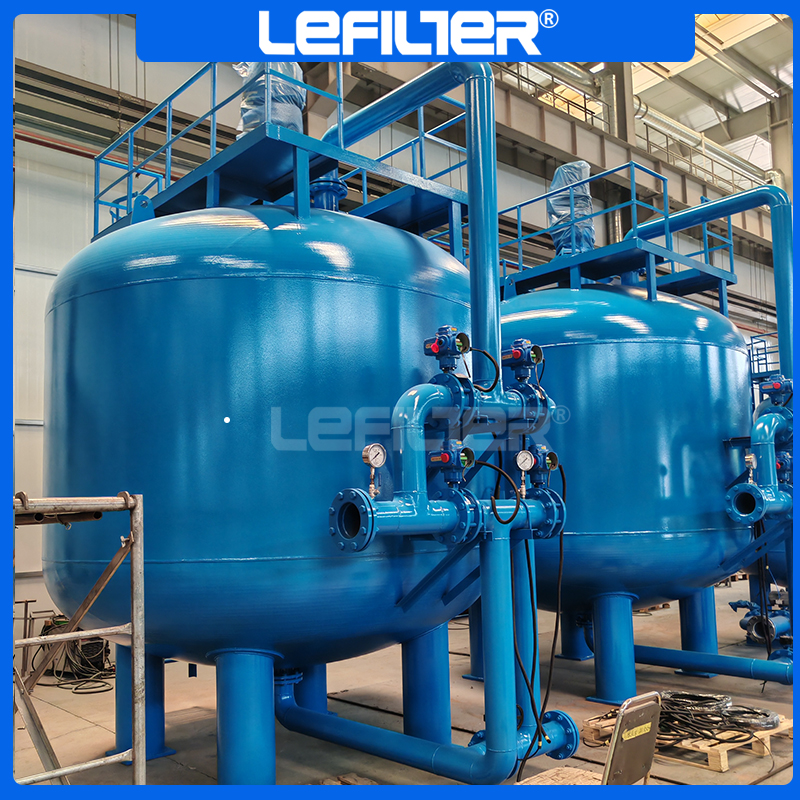Optimizing Multimedia Filters for Industrial Water Treatment
DATE:2024-09-25 Number of views: 1 Source:dongwenhui
Industrial water treatment is critical for maintaining the efficiency and reliability of processes across various sectors, such as power generation, manufacturing, and petrochemical industries. One essential component of this treatment is the use of multimedia filters, which are designed to remove suspended solids from water, ensuring the optimal operation of downstream equipment.
What Are Multimedia Filters?
Multimedia filters are a type of filtration system that uses multiple layers of media, such as gravel, sand, anthracite, and sometimes garnet, to remove particulates from water. Each layer serves a specific role, with finer media capturing smaller particles, and coarser layers trapping larger debris. This layering enhances the filter's ability to handle different types of impurities and extend the system's lifecycle.

Industrial Applications of Multimedia Filters
Multimedia filters are indispensable in sectors where water purity is critical, such as power plants, refineries, and the pharmaceutical industry. For example, in power generation, water quality is paramount for cooling systems and boiler operations. Impurities like silica and suspended solids can cause scaling and corrosion, which lead to reduced heat transfer efficiency and costly equipment failures. Similarly, manufacturing industries rely on clean water for processes like product washing and heat exchange. In these settings, multimedia filters are used as a pre-treatment method, protecting more sensitive downstream systems such as reverse osmosis (RO) membranes.
The Importance of Feedwater Quality
The effectiveness of multimedia filters heavily depends on the quality of the feedwater. High levels of suspended solids, turbidity, or organic content can quickly clog filters, reducing their efficiency and increasing operational costs. Conversely, clean feedwater allows the filter to operate at its intended capacity for longer periods. Pre-treatment measures, such as sedimentation or coagulation, are often employed to improve feedwater quality before it reaches the multimedia filter. In the case of RO systems, pre-filtering feedwater with multimedia filters prevents the fouling of RO membranes, extending their operational life.

Design Parameters for Multimedia Filters
Designing an efficient multimedia filter requires a detailed understanding of several key parameters:
Flow Rate: The filter must be designed to handle the specific flow rate of the process. This ensures that water passes through the filter media at an optimal speed, allowing for the removal of impurities without overwhelming the filter.
Filtration Velocity: Too high of a filtration velocity can cause media loss or breakthrough, where unfiltered particles escape the system. A well-designed filter maintains a balance between filtration velocity and flow rate to ensure consistent water quality.
Media Depth and Size: The depth of each media layer and the size of the particles within those layers determine the filter's ability to capture solids of different sizes. For industrial applications, deeper beds with varying grain sizes are often required to handle high levels of suspended solids.
Backwashing Systems: Over time, the filter media becomes clogged with trapped particles. Backwashing, a process where water flows in reverse through the filter to remove the buildup, is necessary to restore filter efficiency. Automated backwashing systems, common in industrial multimedia filters, reduce labor and downtime by efficiently cleaning the filter bed.
Handling High Flow Rates
One of the challenges in industrial water treatment is managing high flow rates while maintaining effective filtration. Multimedia filters designed for industrial applications often incorporate features such as automated backwashing and larger filter beds to handle these demands. High-flow filters may also use multiple units in parallel to distribute the load, ensuring that water is processed without compromising on quality or efficiency.
Customization for Industrial Needs
Multimedia filters can be customized to suit specific industrial requirements. For example, industries with high chemical use, like oil refineries, may require filters that are resistant to corrosion from acidic or caustic water. Similarly, systems that operate under extreme temperatures or pressures need specialized materials to ensure long-term reliability. In many cases, the filtration media itself can be customized to target specific contaminants, such as heavy metals or organic compounds.
Operational Costs
While multimedia filters are generally cost-effective, their operational costs can vary depending on factors such as water quality, filter size, and maintenance requirements. High levels of suspended solids increase the frequency of backwashing, leading to higher water and energy consumption. However, automation technologies have helped reduce these costs by optimizing backwash cycles and minimizing downtime.

Maintenance Requirements
Regular maintenance is critical to ensuring the longevity and efficiency of multimedia filters. In most industrial settings, backwashing is the primary maintenance activity and should be performed as needed to prevent clogging. Additionally, periodic inspections of the media layers are necessary to assess wear and ensure that the filter continues to operate at its full capacity. Depending on the quality of the feedwater and the filtration rate, media replacement might be required every few years.
Common Issues in Industrial Systems
Some of the most common problems with multimedia filters in industrial systems include:
Media Loss: Over time, media can escape from the system, particularly during backwashing cycles. This can result in poor filtration performance and may require media replacement.
Fouling and Clogging: When filters are overloaded with impurities, they can become clogged, reducing flow rates and increasing the need for maintenance.
Corrosion: In industries that deal with aggressive chemicals, corrosion can shorten the lifespan of filter components if they are not properly designed or maintained.
FAQ
What industries most commonly use multimedia filters?
Industries such as power generation, manufacturing, oil and gas, and pharmaceuticals frequently rely on multimedia filters to ensure water purity for critical processes.
How does the quality of feedwater affect the performance of industrial multimedia filters?
Poor-quality feedwater, high in suspended solids or organic content, can quickly clog filters, reducing their efficiency and increasing maintenance costs.
What parameters are critical for designing multimedia filters in industrial applications?
Key parameters include flow rate, filtration velocity, media depth, and the efficiency of the backwashing system.
How do multimedia filters handle high flow rates in industrial processes?
High-flow systems typically use larger beds, multiple units in parallel, and automated backwashing to handle the increased demand without sacrificing filtration efficiency.
Can multimedia filters be customized for specific industrial needs?
Yes, customization options include specialized media, corrosion-resistant materials, and designs for high-temperature or high-pressure environments.
What are the operational costs associated with industrial multimedia filters?
Operational costs are influenced by factors like water quality, frequency of backwashing, and system automation. Automated systems can lower costs by reducing labor and water usage.
How often do multimedia filters in industrial settings require maintenance?
Maintenance schedules depend on feedwater quality and filter use. Regular backwashing is essential, and media replacement may be required every few years.
Are there any common issues with multimedia filters in industrial systems?
Common issues include media loss, fouling, and corrosion, especially in harsh industrial environments. Regular maintenance helps mitigate these problems.

Industry Solutions
Pure Water /Ultra Pure Water System


